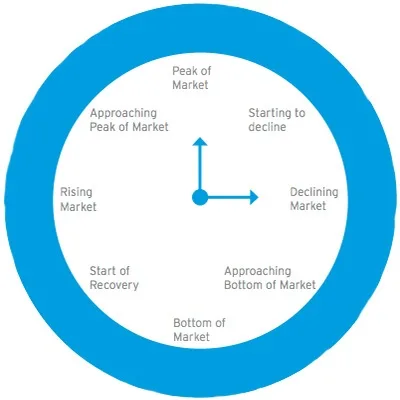Key takeaways
- Most property buyers aren't trying to "time" the market, because property is a long term game that starts with a fundamental understanding of the property cycle.
- Property markets in Australia and around through the world go through a cycle, with periods of high growth and periods of decline.
- You can use a concept called the property clock to visually understand the property cycle.
Understanding the property cycle
The property cycle is a series of events that repeat themselves over and over in a cyclical pattern that impacts on property prices.
This cycle can be broken down into four different phases:
- Rising (or recovery)
- Peak or boom
- Declining
- Bottom
As our population grows the demand for real estate is increased, which causes an increase in property values. This demand is met with keen builders and developers constructing new dwellings to meet demand.
This demand may then peak, as an oversupply of properties can lead to a slump in valuations.
What is the property clock and how does it work?
Investors can track the property market cycle using the property clock, which maps the cycle of rising and falling property demand.
While we've outlined the four phases above you can also think of it as 8 steps.
 This clearly-defined cycle can be expressed in the form of a clock. When the hour hand on the clock is at 12, the property market is in a boom period, demand is outpacing supply and prices are at their peak.
This clearly-defined cycle can be expressed in the form of a clock. When the hour hand on the clock is at 12, the property market is in a boom period, demand is outpacing supply and prices are at their peak.
As the hand moves down clockwise around the face, the market enters a downswing period and prices start to cool until, when the hand reaches 6, there is an oversupply of houses and the market bottoms out.
But then things start to turn around as the recovery period begins. Rental returns start to improve and interest rates fall, which means demand for housing increases and prices start to rise once again.
This continues as the hand moves further around the clock face and up towards 12, the next boom period once again.
How do you identify a city or suburb's position in a property cycle?
The Australian property market is really many smaller markets. Each city has its own market, and even within a city certain suburbs may be at different points on the property clock.
There are many factors to look at when trying to identify where a city is sitting in a property cycle. The local economy, demographics, planned infrastructure and developments can all be key indicators of a suburb on the rise or about to bottom out.
How to evaluate your local property market
- Talk to local real estate agents and get their sense of the current market.
- Check listings online and track property sales.
- Access free suburb reports through websites like Residex.
- Consider trends and growth factors that could increase demand (new job opportunities in the area, new schools, train stations or hospitals being built).
- Consider trends and factors that could reduce demand (large numbers of apartments already built or under construction, local industries declining).
We've also covered off the other ways to research the property market here.
How useful is the property cycle as a concept?
The property cycle is handy as a tool to analyse the current market. It is not a predictor of future performance and should be used in conjunction with other sound research and expert advice.
Knowing the best time to buy within the property cycle also isn't much good if you buy a dud property. Although a useful consideration when searching for your next investment property, the property cycle is not always significant for most long-term investors' strategies.
Sources
Ask a question
More guides on Finder
-
Why are infrastructure developments important for property investors?
Major infrastructure upgrades are frequently associated with strong demand in local markets, as property investors often seek locations with infrastructure developments in the pipeline.
-
How to get FIRB approval when purchasing property in Australia
The FIRB has recently introduced new laws surrounding foreign investment along with new application fees and compliance policies.
-
How to maximise your tax return as an investor
Australia has a unique love affair with property as an investment class. Not only is bricks and mortar seen as a safe investment, but Australia’s tax code means property investors can see enormous benefits at tax time. To make sure you’re getting the most out of your investment property, it’s important to understand the tax benefits available to investors.
-
How to invest in property using a line of credit or home equity loan
If you're looking to invest in property, a line of credit loan could be a great way to leverage the equity in your existing property for a deposit. A home equity loan is a loan in which you put your property up as security to borrow against the equity of your home.
-
Investment loans versus owner-occupier home loans
Learn about the key differences between investment and owner-occupier home loans and find the right type for your needs.
-
Buying an apartment checklist
A guide to buying a unit as a property investment, plus a helpful downloadable checklist.
-
Buying an investment property in a trust
Buying property in a trust can offer tax benefits and excellent asset protection for investors. Here's how it works and some tips to bear in mind.
-
How foreigners can buy investment properties in Australia
The laws around buying Australian property using a foreign income have recently changed, so here’s what you need to do to invest in Australian property.
-
Housing bubbles explained
Is the market downturn evidence of a housing bubble about to pop? We look at property data and expert commentary on Australia's housing market.
